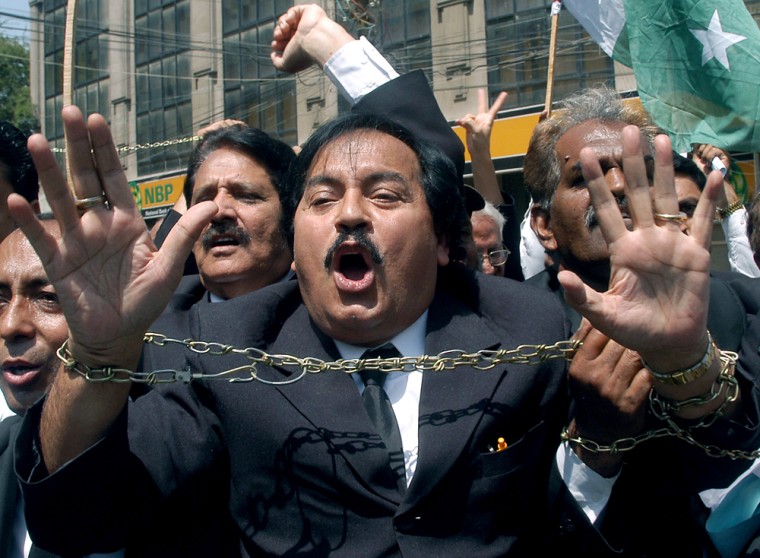Some 4,000 opponents of President Gen. Pervez Musharraf rallied Tuesday in Islamabad in the capital’s biggest street demonstration yet against his removal of Pakistan’s chief justice.
The demonstration by political activists and lawyers outside the Supreme Court during a hearing in the judge’s case remained largely peaceful, but was a sign of the mounting pressure on Musharraf to curtail eight years of military rule.
“Everyone should support the chief justice, it is our moral duty,” Makhdoom Amin Fahim, vice president of the main opposition Pakistan Peoples Party, told the crowd. “Everyone should also help us get rid of President Musharraf, who is the root cause of every problem.”
Thousands more attended rallies in Lahore, Karachi and Quetta.
Musharraf triggered the biggest political crisis of his presidency when he suspended independent-minded chief justice Ifitkhar Mohammed Chaudhry on March 9.
The government says it acted after receiving allegations that Chaudhry had abused his position — for instance, by seeking favors for his son.
However, Musharraf’s critics denounce what they claim was a plot to intimidate the court and ensure it doesn’t stand in the way of an expected bid from the president, a key U.S. ally in its war against international terrorism, to secure another term.
Crowds assail Musharraf
On Tuesday, protesters filled the road in front of the Supreme Court, waving colorful party flags — most of them from an alliance of hard-line religious parties.
“Musharraf, killer of justice,” they chanted, and brandished banners with slogans including, “Don’t destroy the judiciary.”
At a similar protest during the last hearing on March 16, police used tear gas and rubber bullets to contain a phalanx of rock-throwing demonstrators and raided a private TV network offering live coverage of the unrest.
This time, hundreds of police and paramilitary troops were positioned near the court, where concrete blocks and coils of barbed wire closed access roads to traffic.
They scuffled briefly with demonstrators to stop them from following Chaudhry’s car into the court complex and also intervened to rescue several men harangued and beaten by several of the black-suited lawyers.
Police at the scene said the victims were members of the ruling PML-Q party who had begun shouting pro-Musharraf slogans, while lawyers accused them of being undercover intelligence agents.
Tuesday’s hearing adjourned after five hours without any verdict. The next hearing was set for April 13.
Allegations dismissed
Chaudhry’s lawyer’s dismissed the allegations against their client and said his suspension was unconstitutional. They also objected to two of the judges hearing his case and demanded that the closed-door proceedings be opened to the public.
“They don’t have a solid case,” defense attorney Tariq Mahmood told The Associated Press. “The allegations are absurd and, God willing, we will win this legal battle.”
The United States, which lauds Musharraf for pledging to restore democracy, and the European Union have both expressed concern about the judicial standoff and its implications for parliamentary elections due at the end of 2007.
Musharraf is expected to seek re-election as president from the outgoing legislature, a move the opposition could challenge in the Supreme Court, especially if he refuses to give up his post as army chief.
